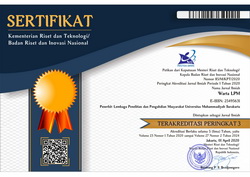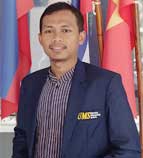Upaya Peningkatan Perilaku Hidup Sehat melalui Program Community-Led Total Sanitation kepada Masyarakat Desa Tumpang, Malang
DOI:
https://doi.org/10.23917/warta.v27i2.4205Keywords:
edukasi, buang air besar sembarangan, pemicuanAbstract
The practice of open defecation remains prevalent in Ledoksari Hamlet, Tumpang Village, Malang Regency. This behavior persists because open defecation has become a normalized culture or habit among the local community. Therefore, a change effort is needed through the implementation of the Community-Led Total Sanitation Approach by the Community Service Team of Universitas Negeri Malang. This program aims to educate the community about the impacts of open defecation. The method used in this program employs a triggering approach that directly involves the community, with stages including pre-triggering, triggering, and post-triggering activities. The outcomes of this initiative reveal an increase in participants knowledge regarding environmental health. Interactive discussions were also conducted by the service team to allow participants to voice their aspirations, which were then communicated to stakeholders. The service team further recommended the implementation of the "Arisan Jamban" program. This program encourages community members to organize activities that promote clean and healthy living behaviors within their environment. Aligned with the first pillar of the Community-Based Total Sanitation (STBM) initiative, which is to stop open defecation, the "Arisan Jamban" program can be utilized as a viable solution to reduce water source contamination.
Downloads
References
Adiyanta, F. S. (2020). Urgensi Kebijakan Jaminan Kesehatan Semesta (Universal Health Coverage) bagi Penyelenggaraan Pelayanan Kesehatan Masyarakat di Masa Pandemi Covid-19. Administrative Law and Governance Journal, 3(2), 272–299. https://doi.org/10.14710/alj.v3i2.272-299
Arfiah, A., Patmawati, P., & Afriani, A. (2019). Gambaran Pelaksanaan Sanitasi Total Berbasis Masyarakat (STBM) Di Desa Padang Timur Kecamatan Campalagian Kabupaten Polewali Mandar. J-KESMAS: Jurnal Kesehatan Masyarakat, 4(2), 113. https://doi.org/10.35329/jkesmas.v4i2.253
Ferry, M., Tohirin, & Susmiati. (2019). Sanitasi Tempat-Tempat Umum Dilengkapi dengan Perspektif Islam. In Uhamka Press (Vol. 53, Issue 9).
Firzah, N., Masyarakat, I. K., Masyarakat, F. K., Islam, U., & Utara, N. S. (2023). Promosi Kesehatan Stop Buang Air Besar Sembarangan ( BABS ) Melalui Pendekatan STBM Pilar Pertama. 2(3), 511–521. https://doi.org/10.55123/sehatmas.v2i3.1804
Fitria, S. N., & Prameswari, G. N. (2021). Indonesian Journal of Public Health and Nutrition. Indonesian Journal of Public Health and Nutrition, 1(1), 472–478. http://journal.unnes.ac.id/sju/index.php/IJPHN
Hargono, A., Waloejo, C., Pandin, M. P., & Choirunnisa, Z. (2022). Penyuluhan Pengolahan Sanitasi Air Bersih untuk Meningkatkan Kesehatan Masyarakat Desa Mengare, Gresik. Abimanyu: Journal of Community Engagement, 3(1), 1–10. https://doi.org/10.26740/abi.v3n1.p1-10
Ikhsanto, jurusan teknik mesin L. N. (2020). PENDAMPINGAN MASYARAKAT DESA KLOPOSAWITCANDIPURO LUMAJANG DALAM MENGURAI KEBIASAAN BUANG AIR BESAR DI SUNGAIBERBASIS PARTICIPATORY ACTION RESEARCH. 21(1), 1–9.
Lusiana, N., Widiatmono, B. R., & Luthfiyana, H. (2020). Beban Pencemaran BOD dan Karakteristik Oksigen Terlarut di Sungai Brantas Kota Malang. Jurnal Ilmu Lingkungan, 18(2), 354–366. https://doi.org/10.14710/jil.18.2.354-366
Masalah, A., Dunia, O. K., Air, B., Sembarangan, B., Rahia, P., Buton, K., Tahun, T., Sectional, C., Wakeakea, D., Gu, K., & Kunci, K. (2023). Faktor – Faktor yang Berhubungan dengan Perilaku Buang Air Besar Sembarangan ( BABS ) pada Masyarakat di Desa Wakeakea Kabupaten Buton Tengah Factors Associated with Open Defecation Behavior in Communities in Wakeakea Village , Central Buton Regency l Pro. 6(1). https://doi.org/10.36566/mjph/Vol6.Iss1/312
Miskiyah, A. Z., & Dkk. (2023). Sehat Di Desa Kaliboto Kidul Kecamatan Jatiroto Kabupaten Lumajang Dengan Metode Community-Based. Jurnal Abdimas Ilmiah Citra Bakti (JAICB), 4, 80–95.
Radin, M., Jeuland, M., Wang, H., & Whittington, D. (2020). Benefit-Cost Analysis of Community-Led Total Sanitation: Incorporating Results from Recent Evaluations. Journal of Benefit-Cost Analysis, 11(3), 380–417. https://doi.org/10.1017/bca.2020.6
Sa’ban, L. M. A., Sadat, A., & Nazar, A. (2020). Jurnal PKM Meningkatkan Pengetahuan Masyarakat Dalam Perbaikan Sanitasi Lingkungan. Dinamisia : Jurnal Pengabdian Kepada Masyarakat, 5(1), 10–16. https://doi.org/10.31849/dinamisia.v5i1.4365
Saptenno, M. J., Saptenno, L. B., & Timisela, N. R. (2022). Faktor Yang Mempengaruhi Tingkat Kesadarana Masyarakat Pesisir Terhadap Pengelolaan Sampah di Perairan Teluk Ambon Kota Ambon. Jurnal Ilmu Lingkungan, 20(2), 365–374. https://doi.org/10.14710/jil.20.2.365-374
Surya Dewi, N. M. N. B. (2021). Analisa Limbah Rumah Tangga Terhadap Dampak Pencemaran Lingkungan. Ganec Swara, 15(2), 1159. https://doi.org/10.35327/gara.v15i2.231
Vijayan, B., & Mishra, U. (2020). Associating State of Water and Sanitation with Childhood diarrhoea: Anomalies and Contradictions. Experimental Results, 1, 1–10. https://doi.org/10.1017/exp.2020.9
Yuniartika, M. D. (2022). Faktor Yang Mempengaruhi Keberhasilan Program Stbm Pilar 1 Dengan Kejadian Stunting. Jurnal Sulolipu, 22(8.5.2017), 2003–2005.
Yuningsih, R. (2019). Strategi Promosi Kesehatan dalam Meningkatkan Kualitas Sanitasi Lingkungan. Aspirasi: Jurnal Masalah-Masalah Sosial, 10(2), 107–118. https://doi.org/10.46807/aspirasi.v10i2.1391
Downloads
Submitted
Accepted
Published
How to Cite
Issue
Section
License
Copyright (c) 2024 Warta LPM

This work is licensed under a Creative Commons Attribution 4.0 International License.















